-
252025. 11
No. 227 View. 996
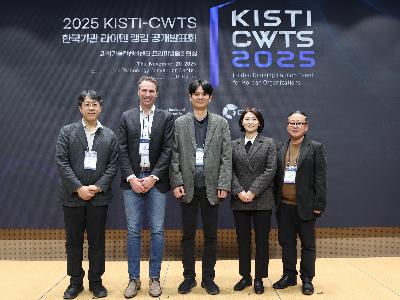
KISTI Releases the “Science & Technology Scoreboard 2025” Covering Major Global ...
KISTI Releases the “Science & Technology Scoreboard 2025” Covering Major Global Countries and Domestic Research Institutions - Joint Research with the Centre for Science and Technology Studies (CWTS), Leiden University - A High-Quality Exploration Tool Offering a Comprehensive View of Global R&D Activity □ The Korea Institute of Science and Technology Information (KISTI, President Lee Sik) announced on Thursday, November 20, the release of the Science & Technology Scoreboard 2025, developed through joint research with the Centre for Science and Technology Studies (CWTS) at Leiden University in the Netherlands. The Scoreboard allows users to examine the research performance of major countries worldwide as well as Korean research institutions through a wide range of indicators. ☞ Science & Technology Scoreboard: globalrnd.kisti.re.kr/scoreboard ☞ Datasheet: zenodo.org/records/17570482 □ This year marks the second public release, following the initial pilot version in 2023, and features a significantly expanded analytical scope. The global country scoreboard now covers 45 countries (up from 20), and the domestic institutional scoreboard has broadened its coverage from 196 to 359 Korean institutions. In addition, a new scoreboard for 25 major global public research organizations—including members of the National Research Council of Science & Technology (NST)—has been added. KISTI and CWTS also conducted a rigorous standardization of Korean institution names and applied the same analytical framework used in the CWTS Leiden Ranking, ensuring improved reliability and consistency across indicators. □ At the ranking launch event jointly organized by KISTI and CWTS, Dr. Jinseo Park and Dr. Mark Neijssel presented the data sources, methodology, and key indicators used in the scoreboard, including scientific impact, collaboration, open access, and gender. Dr. Sejung Ahn, Head of Science and Technology Indicators Research Team demonstrated how the Scoreboard can be used not merely for ranking institutions, but for analyzing diverse aspects of scientific activity through evidence-based research data. □ Prof. Ludo Waltman, Scientific Director of CWTS and lead of the Leiden Ranking, emphasized the importance of transparency and openness in research assessment. “Traditional university rankings do not fully align with the principles of Open Science,” he noted. “CWTS will continue to enhance data transparency and broaden coverage to include regional journals, ensuring that rankings better reflect the diversity of research ecosystems.” □ Dr. June Young Lee, Director of Center for Global R&D Data Analysis, highlighted the Scoreboard’s strategic value. “The Science & Technology Scoreboard is a high-quality exploration tool that enables users to directly examine different dimensions of national scientific activity,” he said. “We hope it will serve as a valuable resource for understanding Korea’s global position and strategic direction in science and technology, moving beyond simple rankings to inform evidence-based R&D policy and planning.” KISTI and CWTS representatives pose for a group photo. Dr. Sejung Ahn, Head of the Science & Technology Indicators Research Team at KISTI’s Center for Global R&D Data Analysis, introduces the Science & Technology Scoreboard. -
112025. 11
No. 226 View. 3071
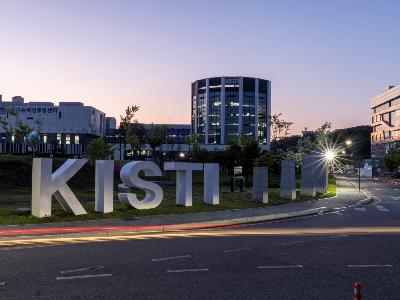
KISTI Collaborates with NVIDIA to Advance Quantum Computing and Scientific AI Us...
KISTI Collaborates with NVIDIA to Advance Quantum Computing and Scientific AI Using Korea’s 6th National Supercomputer, HANGANG The Korea Institute of Science and Technology Information (KISTI) is collaborating with NVIDIA to establish a Center of Excellence (CoE) that will foster joint research and innovation using Korea’s sixth-generation national supercomputer, HANGANG, powered by NVIDIA accelerated computing. Through this partnership, KISTI and NVIDIA will work together to build a hybrid quantum–GPU computing environment by using NVIDIA NVQLink™ and CUDA-Q™, enabling advanced research in quantum-classical hybrid computing. The collaboration also includes the development of AI foundation models for science and engineering using NVIDIA PhysicsNeMo™, an open framework for physics-informed AI. * NVIDIA Newsroom (EN):https://blogs.nvidia.com/blog/korea-ai-apec-ceo-summit/ -
242025. 10
No. 225 View. 6621
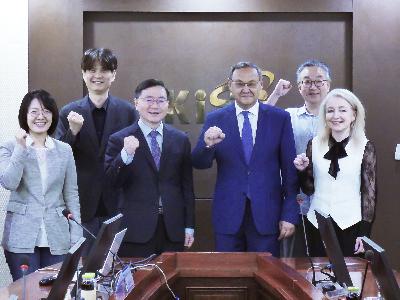
KISTI and NAS Signed Agreement to Launch "AI SilkNet Center", Strategic AI Hub i...
KISTI and NAS Signed Agreement to Launch "AI SilkNet Center", Strategic AI Hub in Central Asia In a major step toward regional innovation and scientific collaboration, the Korea Institute of Science and Technology Information (KISTI) and the National Academy of Sciences of the Republic of Kazakhstan (NAS) signed a formal agreement on October 15, 2025, to establish the AI SilkNet Center - a joint hub for foresight research and predictive analytics based in Almaty, Kazakhstan. The signing ceremony, held at KISTI’s Seoul Branch, brought together the leadership from both institutions, including Dr. Sik Lee, President of KISTI, and Dr. Akylbek Kurishbayev, President of NAS. The event marked the culmination of months of bilateral planning aimed at leveraging artificial intelligence to address regional challenges in science, technology, and sustainable development. In his welcome address, Dr. Lee emphasized the transformative potential of AI in Central Asia, stating, “The AI SilkNet Center is not just a research facility - it is a bridge between nations, disciplines, and generations. Together, we will empower communities and shape a smarter future.” The selected focuses of the AI SilkNet Center are: - Developing multiple databases and digital platforms for technology foresight - Implementing technology foresight methodologies for STI planning - Facilitating joint research, expert exchanges, and regional training programs KISTI will provide its expertise in digital infrastructure, data analysis and technology foresight, while NAS will host the physical center in Almaty. The Center aims to become a catalyst for AI-powered solutions in areas such as environmental monitoring, healthcare diagnostics, and education access. Funding will be sourced from international grants, public-private partnerships, and revenue-generating services. The AI SilkNet Center is expected to begin operations in early 2026, ushering in a new era of regional cooperation and data-driven innovation. -
222025. 10
No. 224 View. 6772
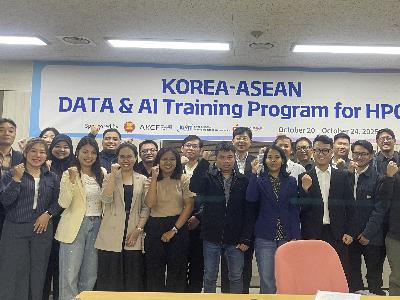
KISTI Launches its 2nd Training Program to Build HPC Infrastructure for ASEAN Da...
KISTI Launches its 2nd Training Program to Build HPC Infrastructure for ASEAN Data Utilization □ The Korea Institute of Science and Technology Information will conduct the second five-day training program of its project “Building HPC Infrastructure and HPC Capacity for ASEAN Data Utilization” from Monday 20 October to Friday 24 October. □ This project is part of the Korea-ASEAN Digital Innovation Flagship (KADIF), launched during the Korea-ASEAN Summit in September 2023. With support from the ASEAN-Korea Cooperation Fund (AKCF), a total budget of USD 10 million (approx. KRW 14 billion) has been secured for four years from September 2024 to September 2028. □ The initiative aims not only to train talent via these training programs, but also to build HPC infrastructure, promote utilization of research networks and the National Science & Technology Information Service (NTIS) data, and thereby contribute to the digital advancement and science & technology development of ASEAN countries. □ The training program is designed to transfer KISTI's long-standing HPC operational know-how to ASEAN nations, cultivating core talent in AI and data utilization. Over the four-year project period, two sessions per year will be held, each with 20 participants — a total of eight sessions training 160 individuals. Through this, KISTI will support ASEAN countries that lack HPC environments by providing education in HPC operations and AI technologies to boost their science and technology competitiveness. □ The course modules include ▲the Fourth Industrial Revolution with an AI focus, ▲Linux programming for HPC environments, ▲Machine-learning models, ▲Understanding and Utilizing Supercomputers, ▲High-performance network and quantum-cryptography communication, ▲Introduction to NTIS and its utilization, and ▲High-performance computing for AI. □ President Sik Lee of KISTI remarked, “The high satisfaction of participants from the first training held in February encouraged us. Through the eight sessions planned over the project period, we aim to nurture core HPC talent in ASEAN and lay a foundation for stronger Korea-ASEAN science and technology cooperation.” Group Photo of Participants of the 2nd HPC Training Program for ASEAN Data Utilization at KISTI -
012025. 10
No. 223 View. 7392
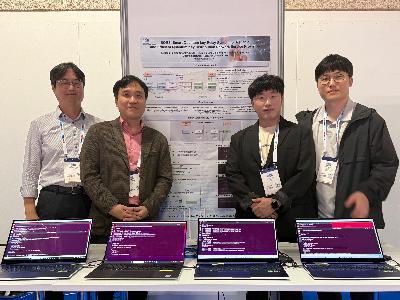
KISTI Demonstrates Quantum-key Relay System at ECOC 2025, Selected as the Only A...
KISTI Demonstrates Quantum-key Relay System at ECOC 2025, Selected as the Only Asian Demo for Two Consecutive Years - Demonstration of secure quantum key delivery across independent networks - Expanding interoperability beyond vendor and operator boundaries □ The Quantum Network Research Center of the Korea Institute of Science and Technology Information showcased its Smart Quantum-key Relay System (SQRS) at the European Conference on Optical Communication 2025 (ECOC 2025), held in Copenhagen, Denmark, on September 30. □ ECOC is Europe’s largest academic conference on optical communications, where leading research institutions and industry players from around the world present their latest technologies and findings. Among this year’s entries, only seven demonstrations were selected, and KISTI’s team was the sole representative from Asia—for the second consecutive year, reaffirming its global leadership in quantum communication research. □ The SQRS enables secure and intelligent quantum key delivery between independently operated Quantum Key Distribution (QKD) networks. Unlike conventional dependent structures, SQRS is designed to allow flexible and efficient key exchange between vendors and operator networks without the risk of information leakage. Notably, its ability to dynamically select the optimal encryption method according to each user’s security requirements and available quantum key capacity minimizes transmission latency and enhances overall operational efficiency—making it a core technology for scalable quantum communication networks. □ Wonhyuk Lee, Director of KISTI’s Quantum Network Research Center, stated, “SQRS is a key technology that enables the practical expansion of quantum communication networks. We expect this demonstration to further strengthen research collaboration with domestic and international institutions in the quantum communication field.” □ The study’s lead author, Kyuseok Sim, Senior Research Engineer at the same center, added, “Through SQRS, both service providers and users can benefit from a more efficient and interoperable ecosystem. We anticipate that this technology will contribute to promoting collaboration, reducing costs, and accelerating innovation within the global quantum communication industry.” Researchers at KISTI’s Quantum Network Research Center (From left: Wonhyuk Lee (Director), Chankyun Lee, Kyuseok Sim, and Jubong Kim) Process of the Smart Quantum-key Relay System (SQRS) -
262025. 09
No. 222 View. 7051
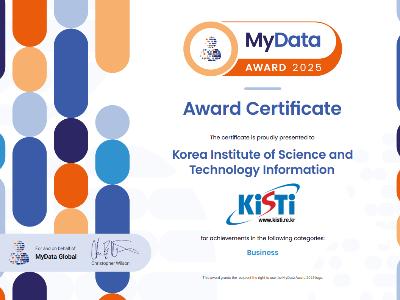
“MoveMate” developed by KISTI Wins International Award for Supporting Expectant ...
“MoveMate” developed by KISTI Wins International Award for Supporting Expectant Mothers - MyData-based public service enhances mobility for pregnant women and boosts local economy - Recognized internationally as an inclusive innovation model extendable to other vulnerable group □ The Korea Institute of Science and Technology Information announced that its MyData-based public service, “MoveMate,” received the MyData Awards 2025 in the Business Category. □ The MyData Awards, presented by MyData Global, celebrate outstanding achievements in building a human-centric data ecosystem. After two months of nominations and evaluations that began in August 2024—covering more than 400 submissions—the final winners were announced in April 2025. The awards ceremony took place on September 25 during the MyData 2025 Conference held in Helsinki, Finland. □ KISTI ted “MoveMate,” a MyData-based mobility support service for pregnant women in Daejeon City, in the business category. Developed in collaboration with Daejeon Metropolitan City, the Daejeon Transportation Service Center for the Mobility Disadvantaged, and Hana Card, MoveMate has been in official operation since April 2024. The service allows pregnant women residing in Daejeon to receive voucher benefits when using taxis, based on their personal data. □ MoveMate stands out for its user-consented integration of data scattered across multiple institutions, such as qualification information for pregnant women and taxi payment records. By enabling users—the owners of their data—to directly experience the benefits of data utilization and receive economic rewards through vouchers, the service exemplifies the essence of a human-centered data ecosystem. □ Importantly, MoveMate enhances mobility for expectant mothers without increasing the number of existing special transportation vehicles, such as voucher taxis. It simultaneously contributes to the local taxi industry’s revenue growth and fosters a virtuous cycle within the local economy by limiting payment methods to regional currencies. Its scalable model also offers strong potential for expansion to other vulnerable or mobility-challenged groups in the future. □ KISTI President Sik Lee stated, “This award marks an international recognition of MoveMate’s social reliability as a public service,” adding that, “KISTI will continue to generate social value by expanding the use of not only scientific and technological data but also personal data to address public challenges.” -
032025. 09
No. 221 View. 7195
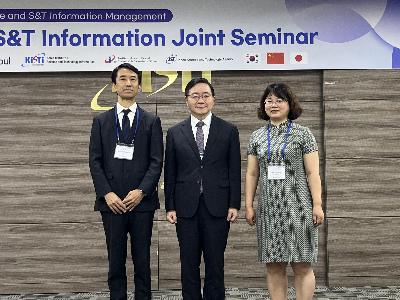
KISTI Hosts the 12th Korea-China-Japan S&T Information Joint Seminar
KISTI Hosts the 12th Korea-China-Japan S&T Information Joint Seminar - Discussing AI-driven changes in the research environment and data management strategies - □ The Korea Institute of Science and Technology Information hosted the 12th Korea-China-Japan Science and Technology Information Joint Seminar from September 2 (Tuesday) to 3 (Wednesday), in collaboration with the Institute of Scientific and Technical Information of China (ISTIC) and the Japan Science and Technology Agency (JST). The event brought together more than 40 experts in science and technology data and artificial intelligence (AI) from the three countries and concluded successfully. □ This year’s seminar was held under the theme “AI’s Impact on the Research Lifecycle and S&T Information Management.” Participants examined how AI is reshaping the research environment from the perspective of scientific data curation, while also sharing national responses and strategies. The discussions covered topics such as policies, legal frameworks, and technological challenges related to scientific data curation. * S&T Data Curation: A set of activities that actively collect, process, store, and preserve science and technology data while adding value to make them usable both now and in the future. It also encompasses the processes, relationships, and activities required at each stage. □ In the thematic sessions, experts delivered presentations and held discussions on topics including: ▲AI-based S&T data management and information services, ▲Development and application of large language models (LLMs) in the field of science and technology, ▲Use of AI in scholarly communication and data right issues. □ KISTI President Sik Lee stated, “this seminar provided an important opportunity for the science and technology information institutes of Korea, China, and Japan to share the latest developments in AI, data policy, and scholarly communication. By g on AI- and LLM-based research cases, we hope this meeting will serve as a foundation for innovation in the science and technology information ecosystem and for strengthening international cooperation.” Representatives from KISTI, ISTIC, and JST pose for a photo. (From left: Emori Masanori, Director, JST; Sik Lee, President, KISTI; He Yanqing, Team Leader, ISTIC) Participants of the 12th Korea-China-Japan S&T Information Joint Seminar gather for a group photo. -
082025. 07
No. 220 View. 6409
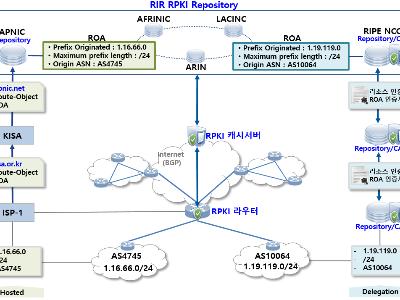
KISTI Becomes the First in Korea to Fully Implement Routing Security (RPKI) Acro...
KISTI Becomes the First in Korea to Fully Implement Routing Security (RPKI) Across KRONET - Enhancing network security and reliability by preventing route hijacking and manipulation - Supporting MANRS implementation and strengthening a secure networking foundation □ The Korea Institute of Science and Technology Information announced that it has become the first organization in Korea to fully implement Resource Public Key Infrastructure (RPKI) across the Korea Research Environment Open NETwork (KREONET), a national research and education network that supports research data transmission for the science and industrial communities. □ This initiative was carried out in cooperation with the Korea Internet & Security Agency (KISA). Together, the two institutions established a routing authentication system by generating Route Origin Authorizations (ROAs) for the Autonomous System Number (ASN) of KREONET and enabling route validation. This ensures that IP address advertisements on the network originate only from authorized sources, effectively preventing route misconfigurations or malicious hijacking attempts that can threaten network security. □ RPKI is a security technology that prevents falsification or tampering of Internet routing information. The Internet uses the Border Gateway Protocol (BGP) to establish communication paths; if routing information is incorrect, data may be misrouted or communication outages can occur. For instance, in 2020, a routing error in Russia caused major global services like Google and Amazon to experience disruptions, while Korea also experienced similar incidents — including the 2021 KT nationwide Internet outage and the 2022 Kakao service disruption. To address such vulnerabilities, countries around the world are increasingly adopting RPKI to build safer and more reliable Internet environments. □ KISTI’s full-scale adoption of RPKI marks a major milestone in its implementation of MANRS (Mutually Agreed Norms for Routing Security), a global initiative aimed at strengthening Internet security, and represents a key step in enhancing the long-term security infrastructure of KREONET. The initiative will enable more secure high-reliability network services for large-scale data transmission based on AI and High-Performance Computing (HPC), and provide a stable networking foundation to support large-scale collaborative research and international cooperation. Going forward, KISTI plans to further strengthen real-time RPKI validation, automate ROA management, and enhance multi-party RPKI interoperability to expand secure connections with domestic and international partners. □ The introduction of RPKI to KREONET is not merely a technical achievement but also a symbolic milestone demonstrating Korea’s active participation in the global routing security ecosystem. It is expected to raise awareness among Korean network operators of the importance of routing security and encourage broader adoption across sectors. □ Buseung Cho, Director of the KREONET Center at KISTI, stated, “The adoption of RPKI will significantly enhance the security level of our research network and reinforce the trust foundation of Korea’s Internet infrastructure,” adding that, “We will continue to develop best practices to encourage the expansion of RPKI adoption across private, public, and local government networks.” Status of Routing and ROA Implementation in KREONET Configuration of the RPKI System -
072025. 07
No. 219 View. 6071

KISTI Selected to Lead National Project,“the Establishment of Quantum Computing ...
KISTI Selected to Lead National Project,“the Establishment of Quantum Computing Services and Utilization Framework” - Introduction of IonQ’s 100-qubit quantum computer Tempo - Implementation of an integrated quantum–supercomputing infrastructure service □ The Korea Institute of Science and Technology Information has been selected as the lead organization for “the Establishment of Quantum Computing Services and Utilization Framework” set forth by the Ministry of Science and ICT. This is a key national R&D initiative aimed at establishing a quantum-computing resource base on a national scale and integrating quantum computers with supercomputing infrastructure. □ The project consortium includes Megazone Cloud as the joint research organisation, along with SDT Co., Sookmyung Women’s University, Gwangju Institute of Science and Technology, and Kumo National University of Technology as subcontracted research institutes. Collaboration will span quantum computer deployment, service platform development, quantum-supercomputing hybrid technology development, user support and dissemination. □ Tempo, the next-generation trapped-ion quantum computer built by IonQ, will be installed at KISTI’s headquarters. This barium-ion system offers long coherence times, high fidelity, and full all-to-all qubit connectivity—the characteristics that enable broad application potential in quantum computing. KISTI signed a memorandum of understanding (MoU) with IonQ on April 16. □ Drawing on its long-standing experience in operating national supercomputing infrastructure, KISTI will build and operate a stable quantum-computing infrastructure, enabling a research and demonstration platform accessible to Korean researchers. Furthermore, a hybrid computing platform will be implemented in collaboration with Korea’s forthcoming 6th national supercomputer, expected to be operational in 2026. □ Beyond infrastructure, KISTI plans to collaborate with partner organisations to develop and disseminate industry-applicable quantum-computing platforms. KISTI will operate various programs including quantum-computing training, hands-on hackathons and workshops, and industry-tailored consulting—creating an environment where academia, industry and research institutions can directly engage with and utilise quantum-computing technology. □ As the National Supercomputing Center under law, KISTI has long supported advanced problem-solving in academia and industry using national R&D data infrastructure, artificial intelligence (AI), and high-performance computing (HPC). With this project, KISTI further strengthens its role as a public R&D infrastructure provider in the quantum-computing domain. □ “I am confident that this newly introduced quantum computer will operate not only independently, but also in hybrid mode with our supercomputer. This will support Korean researchers, students and corporate specialists in effectively harnessing the quantum-computing environment,” said Sik Lee, President of KISTI. “Through this project, we aim to accumulate national-level operational, service and utilization experience across a variety of quantum platforms, and thereby contribute to advancing quantum-computing research and the industrial ecosystem in Korea.” IonQ’s “Tempo” KISTI Signs a Memorandum of Understanding (MoU) with IonQ -
092025. 06
No. 218 View. 36924
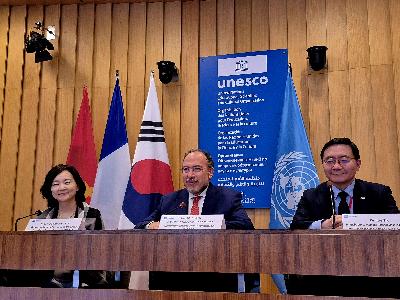
KISTI and UNESCO Launch Full-Scale International Cooperation on Open Science
KISTI and UNESCO Launch Full-Scale International Cooperation on Open ScienceHigh-Level Inaugural Event Held at UNESCO Headquarters in Paris - Collaboration begins in Open Data, Diamond Open Access, and Software Heritage preservation - Collaboration aims to build an inclusive scientific ecosystem for the Global South, including Asia and Africa □ The Korea Institute of Science and Technology Information (KISTI) announced that it successfully co-hosted a “High-Level Launch Event for Strengthening Cooperation in Open Science” with UNESCO on Friday, June 6, at UNESCO Headquarters in Paris, France. The event was broadcast live worldwide both onsite and online. □ Jointly organized by KISTI, UNESCO, and the Permanent Delegation of the Republic of Korea to UNESCO, the event marked the official launch of full-scale cooperation between the two institutions. This collaboration will focus on key areas such as Open Data, Diamond Open Access*, and Software Heritage preservation. It aims to support the implementation of the UNESCO Recommendation on Open Science and contribute to the International Decade of Sciences for Sustainable Development. * Diamond Open Access is a non-profit scholarly publishing model that charges no fees to authors or readers, and is typically managed by academic communities or publicly funded institutions. □ The event brought together approximately 70 high-level representatives from around the world, including officials from the Permanent Delegations of the People's Republic of China and the Slovak Republic to UNESCO, the French National Research Agency (ANR), and the Ministry of Higher Education, Science, Technology and Innovation of the Republic of Angola. Opening remarks were delivered by H. E. Ms. Bak Sang Mee, Ambassador and the Permanent Delegate of the Republic of Korea to UNESCO; Dr. Lee Sik, President of KISTI; Dr. Tawfik Jelassi, Assistant Director-General for Communication and Information of UNESCO; and Dr. Lidia Brito, Assistant Director-General for Natural Sciences of UNESCO. All speakers emphasized the importance of international cooperation, especially in the context of Open Science. □ In his remarks, KISTI President Dr. Lee Sik stated, “KISTI traces its roots back to 1962, when it was founded as the Korea Science and Technology Information Center (KORSTIC) with support from UNESCO, and has since upheld the spirit of international cooperation in scientific knowledge. This project marks a significant milestone in building an inclusive scientific ecosystem that benefits the Global South**, including Asia and Africa.” ** Global South refers not to geographic southern regions but to developing and low- and middle-income countries in political, economic, and historical contexts. □ During the presentation session, KISTI and UNESCO shared the framework of their cooperation and outlined their future vision. A high-level roundtable discussion followed, addressing key topics such as: - Advancing Policies and infrastructure for Diamond Open Access - Preserving software source code as part of the global Software Heritage - Sharing knowledge globally through inclusive strategies □ Dr. Song Sakwang, the project lead at KISTI, stated, “KISTI holds world-class expertise and infrastructure in Open Data, Open Access, and Open Software. We are committed to supporting the enhancement of Open Science capacities across Asia and Africa based on these strengths. Through this initiative, KISTI aims to become a global leader in Open Science and further strengthen Korea’s international standing.” □ The KISTI-UNESCO cooperative project will be implemented over a five-year period from March 2025 to December 2029. It will focus on building inclusive digital infrastructure, expanding institutional support, and developing innovative international cooperation models for Open Science. The initiative will be implemented through regional pilot projects, policy framework development, and capacity-building programs.

 Delete Article!
Delete Article!